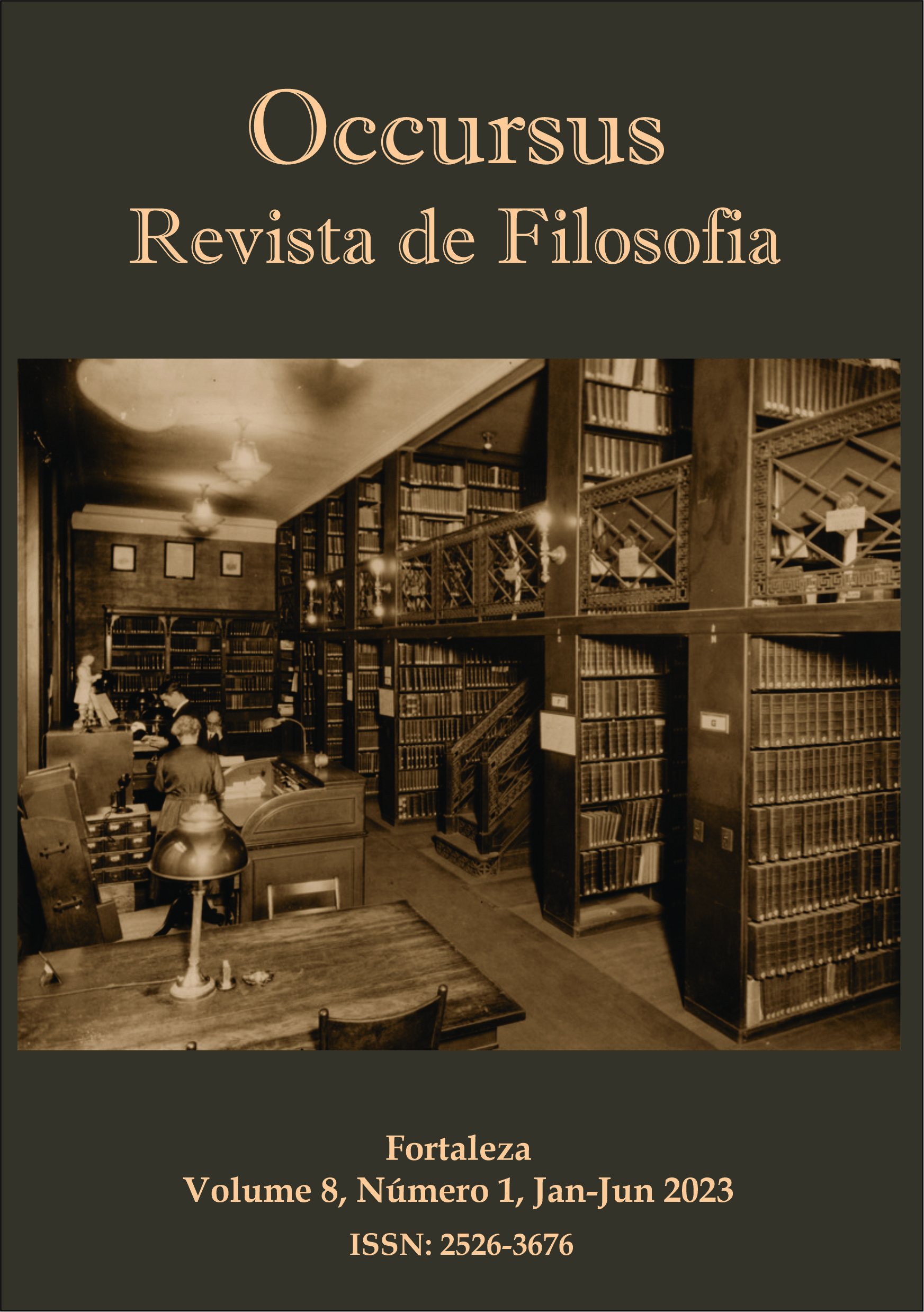Emotion, cognition and action:
emotions as a matter of knowledge and art in aristotelian philosophy
Keywords:
Aristotle. Emotions. cognition. Moral. Poetics.Abstract
The aim of this text is to present a characterization of emotions in Aristotelian philosophy, in order to explain how they become a matter of knowledge and art in poetry. Based on different works by Aristotle, especially De anima, Nicomachean Ethics, Rhetoric and Poetics, we explore those aspects of emotions that make explicit the continuities between the domains of psychology, morals and art. Such aspects concern the way in which they are constitutive of the human being, have a cognitive character that can be described and rationally apprehended, they are involved in the axiological universe of morals and the purpose of poetry. This can be understood most clearly in relation to the emotions of pity and fear in tragic poetry. In any case, the aspects through which Aristotle understands emotions give him the right conditions to conceive of them as a matter of knowledge and art.
References
ARISTÓTELES. Retórica. 2. ed. Tradução de Manuel Alexandre Júnior et al. Lisboa: Imprensa Nacional/Casa da Moeda, 2005, v. VIII. Tomo I (Obras Completas de Aristóteles).
ARISTÓTELES. Ética a Nicômaco. Tradução de Leonel Vallandro e Gerd Bornheim. São Paulo: Nova Cultural, 1987. (Os pensadores)
ARISTOTLE. Nicomachea Ethics. Translated by E. D. Ross. In. BARNES, J. Complete Works (Aristotle). Princeton: Princeton University Press, 1991.
ARISTOTLE. De anima. Tradução de Maria Cecília Gomes dos Reis. São Paulo: Editora 34, 2006.
ADOLFO, R. O estatuto ontológico da emoção e sua relação com a linguagem na Poética de Aristóteles. In. CARVALHO, M; FIGUEIREDO, V. (Orgs). Filosofia antiga e medieval. São Paulo: ANPOF, 2013.
ALMEIDA, N. E. Alguns conceitos fundamentais da teoria aristotélica da significação a partir de Sobre a Interpretação, Capítulo 1. Revista Peri, vol. 5, n. 2, 2013.
BARNES, J (Org.). The Cambridge Companion to Aristotle. Cambridge: Cambridge University Press, 1995.
BARNES, J. et al. Articles on Aristotle: psychology and aesthetics. London: Duckwoth, 1979.
BESNIER, B. Aristóteles e as Paixões. In. As paixões antigas e medievais. São Paulo: Loyola, 2008.
BELO, F. Leituras de Aristóteles e de Nietzsche. Lisboa: Fundação Calouste Gulbenkian, 1996.
BERNAYS, J. Aristotle on the Effect of Tragedy. In. BARNES, J. et al. Articles on Aristotle: psycology and aesthetics. London: Duckwoth, 1979.
BONITZ, H. Index Aristotelicum. Berlim: De Gruyter, 1960/1870.
CASSIN, B. Aristóteles e o Logos. São Paulo: Loyola, 1999.
COUGHLIN, S. The physiological character of aristotelian emotions. University of Western Ontario, 2008.
FORTENBAUGH, William W. Aristotle on Emotion. 2. ed. London: Gerald Duckwoth, 2002.
FORTENBAUGH, William W. Aristotle’s Rhetoric on Emotions. In. BARNES, J. et al. Articles on Aristotle: psychology and aesthetics. London: Duckwoth, 1979.
GOLDEN, L. Aristotle on the Pleasure of Comedy. In. RORTY, A. O. Essays on Aristotle’s Poetics. Princeton: Princeton University Press, 1992.
HALLIWELL, Stephen. Aristotle’s Poetics. With a new introduction. Chicago: The University of Chicago Press, 1998.
HALLIWELL, Stephen. Pleasure, understanding and emotion in Aristotle’s Poetics. In. RORTY, A. O. Essays on Aristotle’s Poetics. Princeton: Princeton University Press, 1992.
LEAR, J. Aristotle: the desire to understand. Cambridge University, 1988.
LEBRUN, G. O conceito de paixão. In. NOVAES, A. (Org.). Os sentidos da paixão. São Paulo: Companhia das Letras, 2009.
LEIGHTON, S. Aristotle and the Emotions. In. RORTY, A. Essays on Aristotle’s Rethoric. Berkeley/Los Angeles: University of California Press, 1996.
LEIGHTON, S. Paixões malévolas e impróprias em diversos domínios. Anais de Filosofia Clássica, v. 3, n. 6, 2009.
MATURANA, H. Emoções e linguagem na educação e na política. Tradução de José Fernando Campos Fortes. Belo Horizonte: UFMG, 1998.
NUSSBAUM, M. C. Aristotle on Emotions and Rational Persuasion. In. RORTY, A. Essays on Aristotle’s Rethoric. Berkeley/Los Angeles: University of California Press, 1996.
NUSSBAUM, M. C. La fragilidad del bien. Cambridge: Cambridge University Press, 2003.
RORTY, A. O. The psychology of aristotelian tragedy. In. RORTY, A. O. Essays on Aristotle’s Poetics. Princeton: Princeton University Press, 1992.
RORTY, A. O. Essays on Aristotle’s Poetics. Princeton: Princeton University Press 1992.
RORTY, A. O. Essays on Aristotle’s Rethoric. Berkeley/Los Angeles: University of California Press: University of California Press, 1996.
RORTY, A. O. Explaining Emotions. Berkeley/Los Angeles: University California Press, 1980.
ROSS, W. D. Aristotle. London/ New York: Routledge, 1995.
SANTORO, Fernando. Os coléricos cômicos (Retórica II, 2). Aisthe, n. 4, 2009.
SANTORO, Fernando. Sobre a estética de Aristóteles. Viso – Cadernos de estética aplicada, n. 2, mai-ago/2007.
SÓFOCLES. Édipo Rei. In. Teatro grego. Introdução, tradução e notas de Jaime Bruna. São Paulo: Cultrix, 1964.
SÓFOCLES. A trilogia tebana: Édipo rei, Édipo em Colono, Antígona. 4. ed. Tradução e apresentação de Mário da Gama Kury. Rio de Janeiro: Jorge Zahar, 1994.
VELOSO, C. W. Aristóteles mimético. São Paulo: Discurso, 2004.
VELOSO, C. W. Depurando as interpretações da Kátharsis na Poética de Aristóteles. Síntese, Belo Horizonte, v. 3, n. 99, 2004.
YARZA, F. I. S. Dicionário griego-español. Barcelona: Ramón Sopena,1964.
ZINGANO, Marco. Estudos de ética antiga. 2 ed. São Paulo: Editorial Paulus, 2009.
ZINGANO, Marco. Razão e Sensação em Aristóteles. Porto Alegre: L&P, 1998.
ZINGANO, Marco. Katharsis poética em Aristóteles. Disponível em: http://www.faje.edu.br/periodicos/index.php/Sintese/article/view/953/1392. Acesso em: 24 jun 2014.
Downloads
Published
How to Cite
Issue
Section
License
Copyright (c) 1969 Rafael Adolfo

This work is licensed under a Creative Commons Attribution 4.0 International License.




